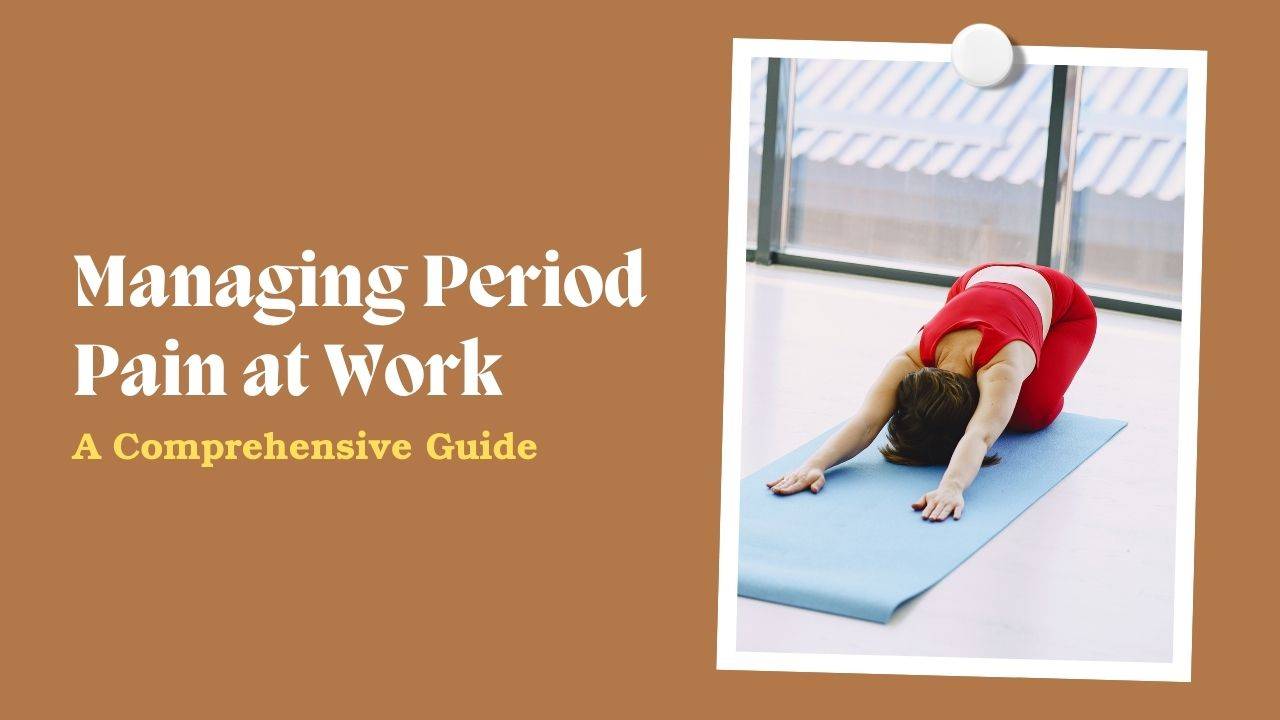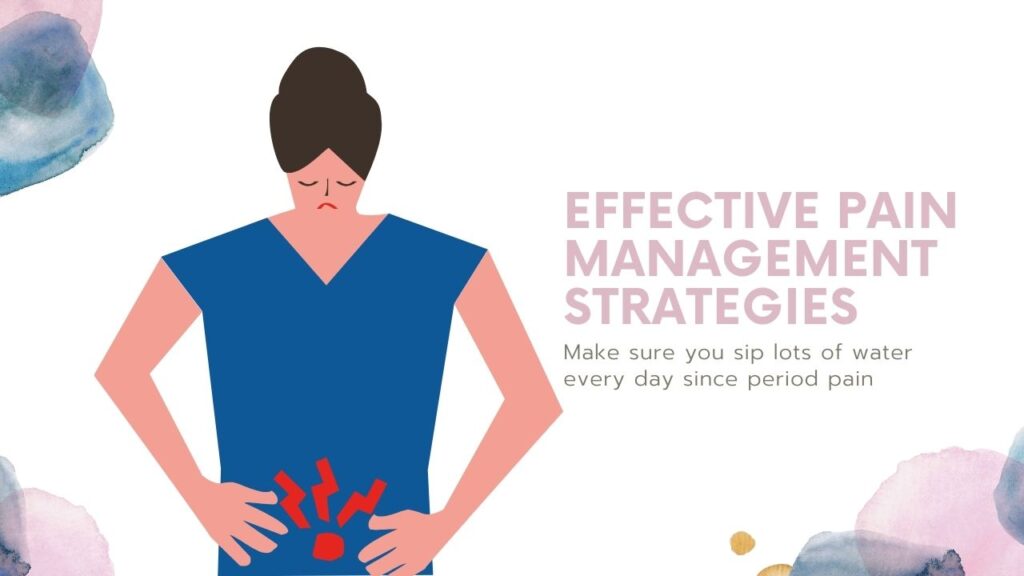Managing Period Pain at Work: A Comprehensive Guide

Managing Period Pain at Work: Particularly in an office, period pain—also known as dysmenorrhea—can be quite problematic. It can change general well-being, productivity, and attention. Still, there are numerous good techniques to control period discomfort at work so you may keep comfort and performance all through the day. This book will offer useful advice and ideas to enable you to negotiate workdays during your menstrual cycle.

Managing Period Pain at Work: Understanding Period Pain
The uterine contraction during shedding of the lining causes period pain. Prostaglandins, hormones-like molecules linked with pain and inflammation, set off these contractions. Severe menstrual cramps may follow from high prostaglandin levels. Period suffering can also be caused by other conditions such endometriosis, fibroids, or pelvic inflammatory disease.
Preparation is Key
1. Track Your Cycle: Monitoring your menstrual cycle enables you to predict when period discomfort is most likely to strike. Many programs exist that can forecast your cycle and assist with your planning. Knowing when your period is due helps you to ready your body and your workload ahead.
2. Plan Ahead: Plan key meetings and deadlines around your menstrual cycle if at all possible. Before your period begins, try to finish high-stress chores so you may relax on the days when pain may be more severe. Use your flexible working hours if those of your company let you.
Effective Pain Management Strategies

1. Stay Hydrated: Make sure you sip lots of water every day since period pain could be aggravuated by dehydration. Try to get at least eight glasses of water and consider anti-inflammatory herbal drinks like ginger or chamomile.
2. Eat Healthful Meals: Some foods might ease period discomfort. Add anti-inflammatory items to your diet such tomatoes, berries, and leafy green vegetables. Additionally helping to lower inflammation are omega-3 fatty acids found in walnuts, flaxseeds, and seafood. Steer clear of foods heavy in sugar, alcohol, and caffeine since these aggravate symptoms.
3.Over-the-Counter Medications: NSAIDs like naproxen and ibuprofen can help to considerably ease menstrual cramps over-the-counter. Take them right at the beginning of discomfort to get best results. Ask inquiries; always follow the dose guidelines and consult your doctor.
4.Heat Therapy: Heat treatment of your lower tummy helps the uterine muscles relax and reduces cramping. Consider running a heating pad, hot water bottle, or sticky heat patch over. Should these options prove unworkable, a heated towel can also be useful.
5.Gentle Exercise: Physical exercise releases endorphins and increases blood flow, both of which can help reduce pain. Especially beneficial are light exercises such yoga, walking, and stretches. You can influence even with a short walk during lunch.
6. Practice Deep Breathing and Relaxation Techniques: Since stress can aggravate period discomfort, finding ways of relaxation is quite important. Deep breathing exercises, meditation, and mindfulness help to reduce stress and improve your general condition of health. Consider using these techniques in brief breaks strewn all over the day.
Read More: The Ultimate Hair Care Routine for Dry Hair in 2024: Tame Frizz and Boost Moisture.
Useful Advice for the Workplace

Make sure your workspace is comfortable. Check its ergonomics. Sit in a chair with enough back support and angle your computer screen at eye level to avoid straining your neck and shoulders. Keeping a tiny cushion or lumbar support pillow at your desk is another smart concept.
2. Take Frequent Breaks: Extended seated can increase pain. Create a habit of quick breaks for standing, stretching, and strolling about. This helps circulation to increase and reduce stiffness.
3. Communicate with Your Employer: If you feel comfortable, bring up your menstrual health with your HR or corporate division. Many companies might offer flexible working schedules or other concessions as many of them are beginning to notice menstrual health issues. Encouragement of your requests will contribute to create a suitable workplace.
4. Use Discreet Pain Relief: Consider using wearable devices with moderate electrical stimulation or transdermal pads to help with cramps or light pain management. Wearing them under clothing will benefit you continuously during the day.
5. Practice Good Hygiene:Regular replacement of sanitary products helps to preserve good menstrual hygiene. Keeping extra pads, tampons, or menstrual cups on hand means being ready at your office. Carry these understatedly in a little bag or pouch.
Emotional and psychological well-being
1. Self-Compassion: Throughout your menstrual cycle, treat yourself gently. Tell yourself you are in pain and allow yourself freedom to relax as needed. Self-compassion can help you be less stressed and more generally healthy.
2. Seek Support: Talking to friends or coworkers who know what you’re going through could offer emotional support. Sometimes simply sharing your experience helps you to feel less alienated and healthier.
3. Professional Help: If period pain affects your everyday life and is severe, you might want to contact a medical practitioner. They can offer guidance on painkillers and look at any underlying medical issues might be causing your discomfort.
Long-Term Management

1. Regular Exercise: Including regular exercise in your schedule will assist you over time control period discomfort. Most days of the week, try for at least thirty minutes of moderate activity. Particularly helpful are pursuits such swimming, cycling, and yoga.
2. Balanced Diet: A balanced diet heavy in fruits, vegetables, whole grains, and lean meats can help lower inflammation and enhance menstrual health. Think about including supplements like vitamin B6 and magnesium, which have been known to ease period problems.
3. Stress Management: Periodic stress might aggravate period discomfort. Learn mindfulness, meditation, and deep breathing among other stress-reducing strategies. Reducing stress also comes from pursuing joyful hobbies and pastimes.
4. Adequate Sleep: Check to make sure you sleep plenty every night. Try for 7 to 9 hours of excellent sleep since inadequate sleep might aggravate menstrual symptoms like period discomfort. Develop a consistent sleeping schedule and design a soothing nighttime surroundings.
Managing period pain at work calls for a mix of office modifications, good pain management techniques, and planning. Tracking your cycle, keeping hydrated, eating a healthy food, and using suitable painkillers will help you to reduce discomfort and preserve output. Keep in mind to schedule frequent breaks, set up a comfortable workstation, and, should necessary, notify your company. Also very important is giving your mental and emotional health top priority. These techniques help you more easily and comfortably negotiate workdays during your menstrual cycle.




Leave a Comment